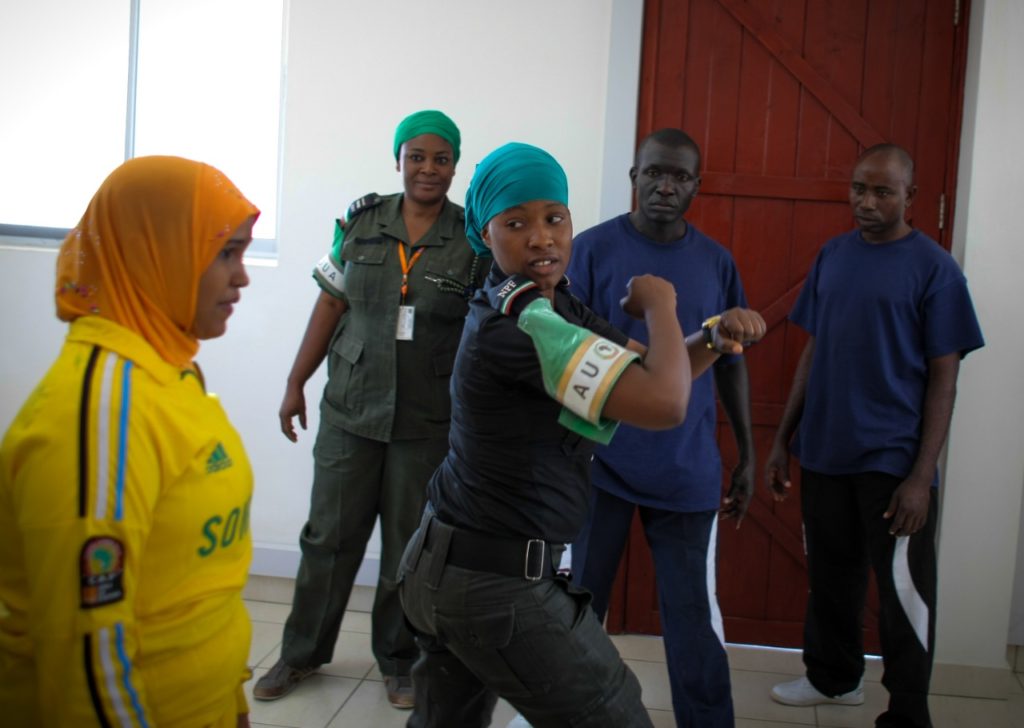MOGADISHU, Somalia, Mar 8 (AMISOM)- In Dhobley, Southern Somalia, Captain Alice Indimuli is an expert in working with explosives.
Importantly, she works to keep herself and her comrades serving under the African Union Mission in Somalia (AMISOM), safe from explosives planted by enemy combatants.
Her job as the Mine Action Officer is fraught with hazard, but Capt. Indimuli is undaunted.
Serving under AMISOM as a member of the Kenyan Defence Force’s engineering corps, Capt. Indimuli is responsible for ensuring that AMISOM troops and Somali Security Forces are adequately prepared and equipped to counter Improvised Explosive Devices (IEDs) while conducting operations.
IEDs have remained a weapon of choice used by the terrorist group Al-Shabaab to target travelers, traders transporting goods, and the convoys of AMISOM and Somalia government forces using the main roads.
“There is the constant danger of exposure to enemy fire and IEDs, so we have to contain and control that threat,” Said Capt. Indimuli.

Putting in place mitigating measures against IEDs is paramount to ensure both the safety and security of AMISOM and Somali Security personnel and equipment as well as the smooth flow of supplies and logistics which are critical for the sustenance of troops and for operational effectiveness.
Capt. Indimuli is one of the hundreds of women deployed to serve under AMISOM and playing an important role in security and stabilisation efforts.
For Warrant Officer Proscovia Abalo, a clinical officer in charge of the COVID -19 Isolation unit at the AMISOM Level 2 Hospital in Mogadishu, the opportunity to contribute to a safe and secure Somalia is her motivation.
The outbreak of the COVID-19 pandemic was particularly challenging for frontline health workers including Abalo and her committed colleagues.
“I am trained not to run away from challenges,” she said, with a confident smile. “The team of nurses I work with – many of whom are women – are emboldened to serve and always give their best to ensure success of the mission,” adds Abalo.

The AMISOM Protection, Human Rights and Gender unit ensures the protection of women and children in armed conflict against sexual and gender-based violence, conflict-related sexual violence, and the recruitment and use of children in combat. The unit also ensures compliance with the International Humanitarian Law in coordination with the Federal Government of Somalia, the Federal Member States, and other partners.
Following the COVID-19 outbreak, the established standard operating procedures limited physical interaction and curtailed the Protection, Human Rights, and Gender Unit’s plans for one-to-one and one-to-group outreach and training sessions to build capacity and raise awareness, advocacy, monitoring, on human rights and protection.
Gloria Jaase Nkundanyirazo, the AMISOM Protection Officer, said, “We moved the much-needed engagements online to train and raise awareness among communities and AMISOM personnel”.
She said there was an increase in violations against women and children, with survivors having to stay with perpetrators because the alternative safe homes closed due to COVID-19.


However, with the COVID-19 situation expected to improve, she is optimistic face-to-face training sessions will resume but with reduced numbers of participants in compliance with established COVID-19 protocols.
“Also, the African Union headquarters issued a policy guide on addressing sexual and gender-based violence during Covid-19 in Africa,” Jaase added.
Ulrike Kahbila Mbuton, the AMISOM Human Rights Officer, noted that movement restrictions during the pandemic hindered some of the planned activities. The activities included refurbishment of schools, provision of education materials, interaction with children, and onsite visits to verify violations.
However, the unit continued to support the Federal Government of Somalia through virtual training sessions for the Somali Security Forces, ministries, civil society, youths, women groups, and community leaders.
“We held online training for troops and communities, conducted social media campaigns to observe key holidays and raise awareness about human rights,” said Kahbila.
Senior Superintendent of Police Hellen Obol is the contingent commander of the Uganda Formed Police Unit. She attests to the support from her male counterparts to enable her to discharge her duties.
“I discharge my duties with no difficulty, with support from both male and female teams across the mission and the Somali Police Force,” says SSP Obol.
Since the establishment of AMISOM in 2007, the number of women serving in the mission has increased, with several of them taking up active leadership roles, in fulfillment of the UN Security Council Resolution 1325 (2000) on Women, Peace, and Security, which recognizes the importance of women’s participation in sustainable peace and security efforts.
AMISOM also adheres to the African Union policy on gender mainstreaming, including ensuring that women meaningfully participate in peace support operations.
Want to send us a story? Contact Shahidi News Tel: +254115512797 (Mobile & WhatsApp)


